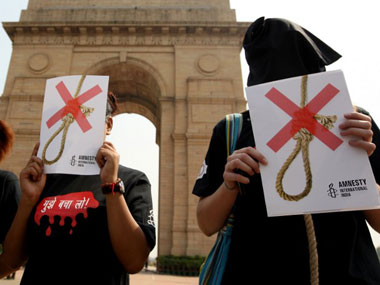On 27 May 2015, the Supreme Court of India in the case of Shabnam vs Union of India gave a ruling which would have far-reaching consequences in so far as the procedural aspects of awarding the death penalty are concerned. The apex court held that trial courts should not issue death warrants unless the convicts had exhausted all legal remedies available to them- an appeal to the high court, then to the Supreme Court, then again review and curative petitions before the top court, and finally, an appeal for clemency to the President of India.
However, despite this dictum, it appears that trial courts in India are handing out the death sentence in undue haste, and without according all due process rights to convicts. In five cases, trial courts issued the death warrant without according the convicts the opportunity to appeal to higher courts.
A death warrant is formally known as a “warrant for execution of a sentence of death”. Form No. 42 in the Second Schedule of the Code of Criminal Procedure (CrPC), 1973 contains the form of the “death warrant” or “black warrant”. It is addressed to the superintendent of the relevant prison who is supposed to return the warrant to the court after certifying that the death sentence has been carried out.
Sections 413 and 414 of the CrPC state that upon the high court confirming a death sentence, the sessions court shall cause that order to be carried into effect by issuing a warrant. In practice, however, since an appeal lies to the Supreme Court against a death sentence, a sessions court would normally refrain from issuing a death warrant.
In case of Javed Khan, the Sessions Judge in Aurangabad issued a death warrant only because the High Court had enhanced his life sentence to one of death. In another, that of Singraha, the warrant was issued within days of his death sentence being confirmed by the Madhya Pradesh High Court, without giving him the chance to appeal to the Supreme Court.
These find mention in the latest report of the National Law University, Delhi’s Centre for the Death Penalty. The report gives all the details of death sentences in India in 2016, and shows that almost the twice the number of death sentences were awarded in that year than in 2015. The numbers stood at 136 for 2016 as opposed to 70 for 2015. The figures are alarming, because as per available data , between the years 2000 and 2015, a total of 1790 death sentences were awarded, bringing the annual average to approximately 119.
“Rarest of Rare” doctrine going unheeded? As per the settled law laid down by the Supreme Court, the death penalty is to be awarded only in the “rarest of rare” cases. Courts are also to follow all necessary safeguards to ensure that capital sentences are only sparingly given- they should be the exception, not the norm. The issue of trial courts handing out a proliferation of death sentences becomes both significant and worrisome because not all of them are executed- an overwhelming number of cases result in complete acquittals or commutations to life terms. This is borne out by numbers.
In 2016, high courts acquitted 14 people, and commuted the sentences of 44. The numbers of acquittals and commutations for the Supreme Court stand at 3 and 7 respectively. Thus, the data shows that adherence to the apex court’s dictum lies in shambles. The year 2016 comes third in the line of annual number of death sentences awarded- it was 186 in 2007, followed by 164 in 2005. With a total number of 397 persons on death row at the end of the year, surely, it is high time for remedying this shambolic state of affairs?


)




)
)
)
)
)
)